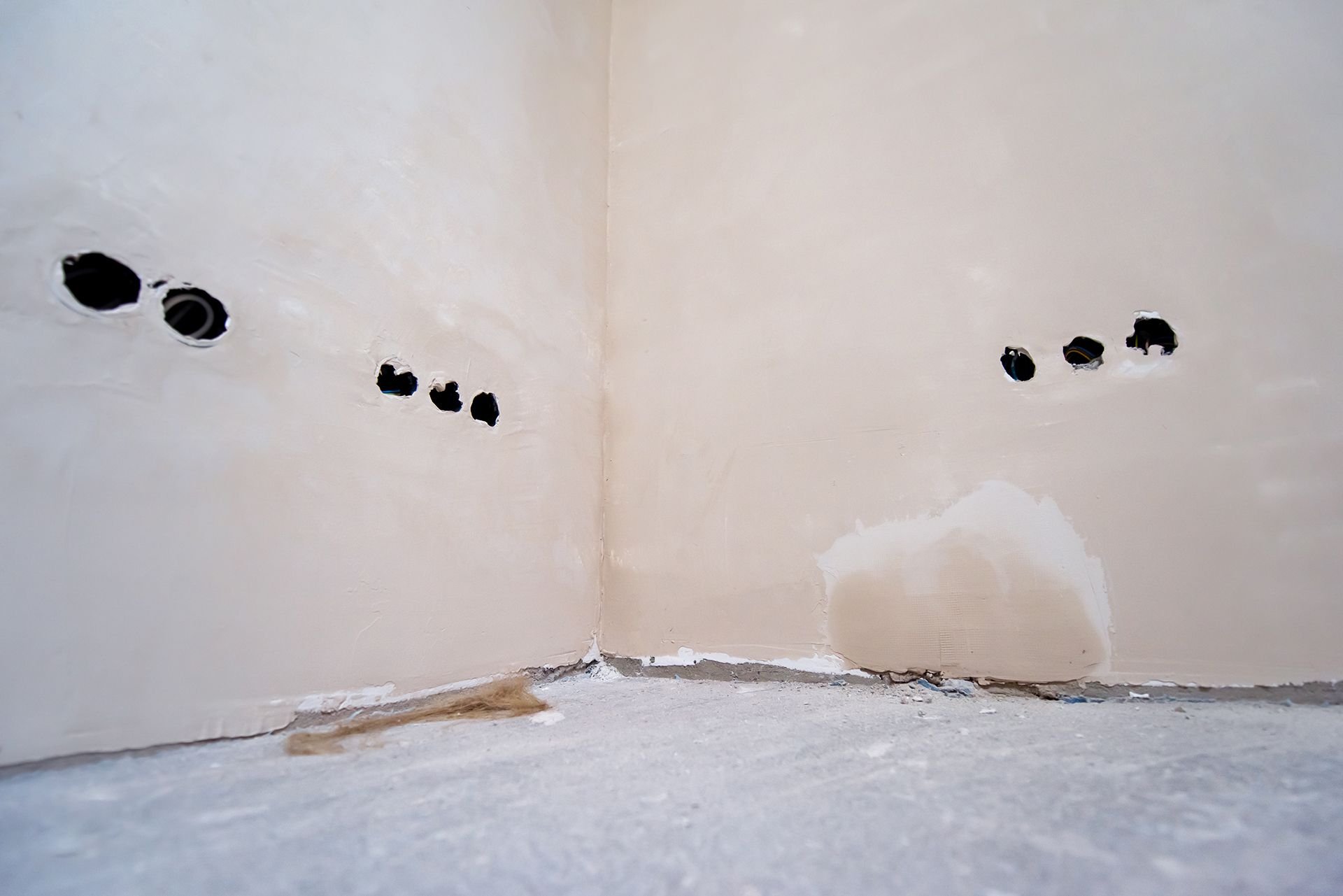Quick Fixes for Common Drywall Problems: DIY or Call a Pro?
Understanding and Fixing Drywall Problems Quickly
Drywall is a common material used in home construction, but it's not immune to damage. Whether you’re dealing with cracks, dents, or holes, drywall issues can affect the appearance of your walls and the overall integrity of your home. So, when should you attempt a drywall repair on your own, and when is it time to call in a professional? In this guide, we’ll walk you through some quick fixes for common drywall problems and help you decide if it’s a DIY job or a task best left to the pros.

Understanding Drywall and Common Problems
Drywall, also known as dry wall or drywall sheet rock, is a construction material made of gypsum plaster pressed between two thick sheets of paper. It’s widely used for building interior walls and ceilings because it’s cost-effective, easy to install, and relatively durable. However, like any material, it can develop problems over time, especially in high-traffic areas or homes exposed to moisture.
Some common drywall issues include:
- Small nail holes
- Cracks from settling
- Dents and dings
- Water damage
- Large holes from accidents
Let’s explore the quick fixes for these issues and determine whether they are suitable for a DIY fix or if you need to search for a drywall repairman near me.
DIY Drywall Fixes for Small Problems
If you're handy and have a few basic tools, tackling smaller drywall repairs yourself can save you time and money. Here are some quick fixes for minor drywall problems:
1. Repairing Small Holes
Small holes from nails or screws are one of the most common drywall issues, and they’re relatively easy to fix.
Materials Needed:
- Drywall compound
- Putty knife
- Sandpaper
- Paint and drywall primer
Steps:
- Clean the hole and surrounding area.
- Apply drywall compound with a putty knife, smoothing it over the hole.
- Once the compound is dry, sand it down to a smooth finish.
- Apply a coat of drywall primer before painting the wall to blend the repair seamlessly.
This type of repair is simple enough for most homeowners to handle, so there’s no need to call a drywall company for small holes.
2. Fixing Hairline Cracks
Hairline cracks are often the result of a house settling over time. These small cracks can typically be repaired using similar methods as small holes.
Steps:
- Widen the crack slightly with a utility knife to create a groove.
- Fill the groove with drywall compound.
- Sand smooth once dry and apply a fresh coat of drywall primer.
- Hairline cracks are generally a DIY job, as long as the crack doesn’t continue to grow over time.
3. Patching Dents and Dings
Minor dents and dings, often caused by furniture bumps or rough play, are another easy drywall repair.
Steps:
- Apply a small amount of drywall compound to the dent.
- Smooth it out with a putty knife.
- Sand and prime before painting to blend the repair with the rest of the wall.
- These types of drywall fixes can be done in a few minutes and don’t require professional help.
When to Call a Drywall Repairman
While small problems are manageable for DIY enthusiasts, larger or more complex dry wall issues might need the help of a professional. Here’s when you should consider calling a drywall repairman near me:
1. Repairing Large Holes
If you have a large hole in your wall from an accident or construction, a simple dry wall patch won’t suffice. Large holes often require cutting out the damaged section and replacing it with a new piece of drywall.
Steps:
- Cut out the damaged drywall.
- Attach a new piece of drywall sheet rock using screws.
- Tape the seams and apply drywall compound.
- Sand smooth and prime before painting.
This type of repair can be tricky for beginners, so it's usually best to call in professional drywall services for the job.
2. Water Damage
Water damage is a serious problem that can lead to mold growth if not handled properly. If your drywall has been soaked or shows signs of warping, it's best to hire a drywall repair dallas expert to assess the damage.
Steps:
- Cut out the damaged area.
- Replace it with new drywall.
- Ensure that the source of the water is fixed to prevent future damage.
- Attempting to handle extensive water damage without experience can lead to bigger problems, so leave it to the professionals.
3. Cracks from Structural Problems
While small hairline cracks are easy to fix, larger cracks that reappear after repair could indicate structural issues. In this case, a professional drywall expert can assess the cause of the cracking and determine if it’s related to the foundation or settling problems.
If structural issues are present, a drywall company may need to work in conjunction with other professionals to ensure the underlying problem is addressed.
Essential Tools and Materials for DIY Drywall Repair
Before you start any DIY wall repair, you’ll need to gather some essential tools and materials:
- Utility knife
- Putty knife
- Drywall compound
- Sandpaper
- Drywall primer
- Drywall tape
- Measuring tape
- Drywall screws
- Drill or screwdriver
Having these tools on hand will make the repair process smoother and help you achieve professional-looking results.
Preparing Your Walls for Repair
Before beginning any repairing drywall holes, it’s essential to prepare the area properly:
- Clean the Surface: Dust and debris can interfere with the adherence of ddrywall compound, so wipe the area clean before starting.
- Remove Damaged Drywall: For larger holes or extensive damage, use a utility knife to cut out the damaged section, making sure the edges are smooth and even.
- Measure and Cut New Drywall: If you’re replacing a section of drywall, carefully measure and cut the new piece to fit the hole.
- Preparation is key to ensuring a successful repair, whether you’re tackling a small patch or a larger replacement.
Drywall Primer: The Key to a Flawless Finish
Once you’ve completed your drywall repair, applying a coat of drywall primer is crucial before you paint. Primer helps create a smooth surface, seals the repaired area, and ensures that the paint adheres properly. Skipping this step can result in an uneven finish and highlight the repaired area, so don’t overlook it!
Hiring a Professional: What to Look For
If you decide that a drywall repairman is the way to go, here’s what to look for in a professional drywall company:
- Experience: Look for contractors with extensive experience in handling drywall repairs.
- References: Ask for references or read online reviews to ensure you’re hiring a reliable service.
- Licensing and Insurance: Make sure the company is licensed and insured to protect both you and the workers.
- Detailed Quote: Get a detailed quote outlining the costs and the scope of the work to avoid any surprises.
- Professional drywall services can help you avoid costly mistakes and ensure the job is done right the first time.
Final Thoughts: DIY or Call a Pro?
When it comes to drywall repair, knowing your limits is essential. While many small dry wall patch jobs can be done yourself with basic tools, larger repairs or those involving water damage and structural issues should be handled by professionals. If you’re in doubt, it’s always a good idea to call a drywall repairman near me for an assessment.
Whether you decide to go the DIY route or hire a professional, understanding the basics of drywall repair will ensure you make the best decision for your home. Proper maintenance and timely repairs will keep your walls looking great and protect the structural integrity of your space.
Incorporating these tips and strategies into your approach will ensure you get the most out of your drywall repair efforts, whether you tackle it yourself or rely on expert drywall services.



